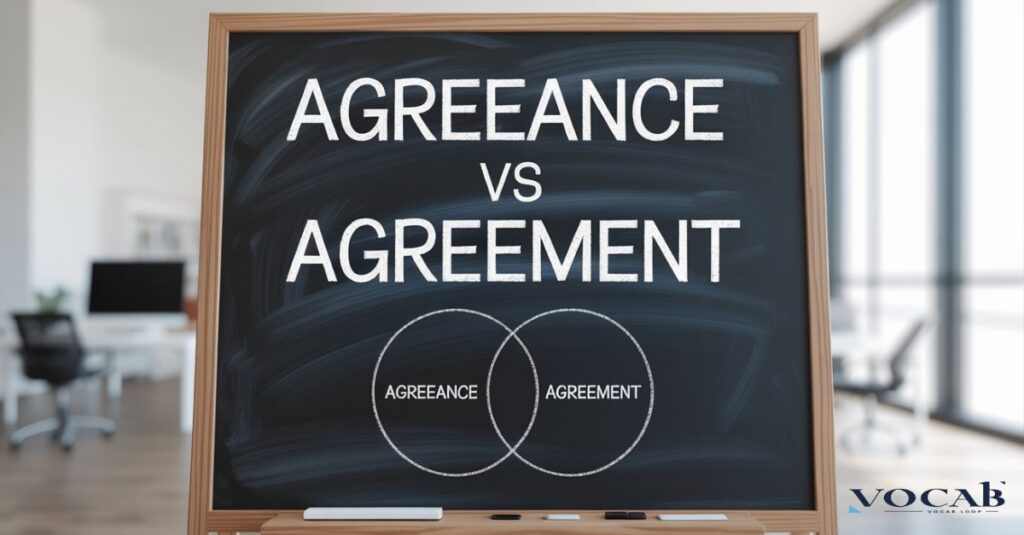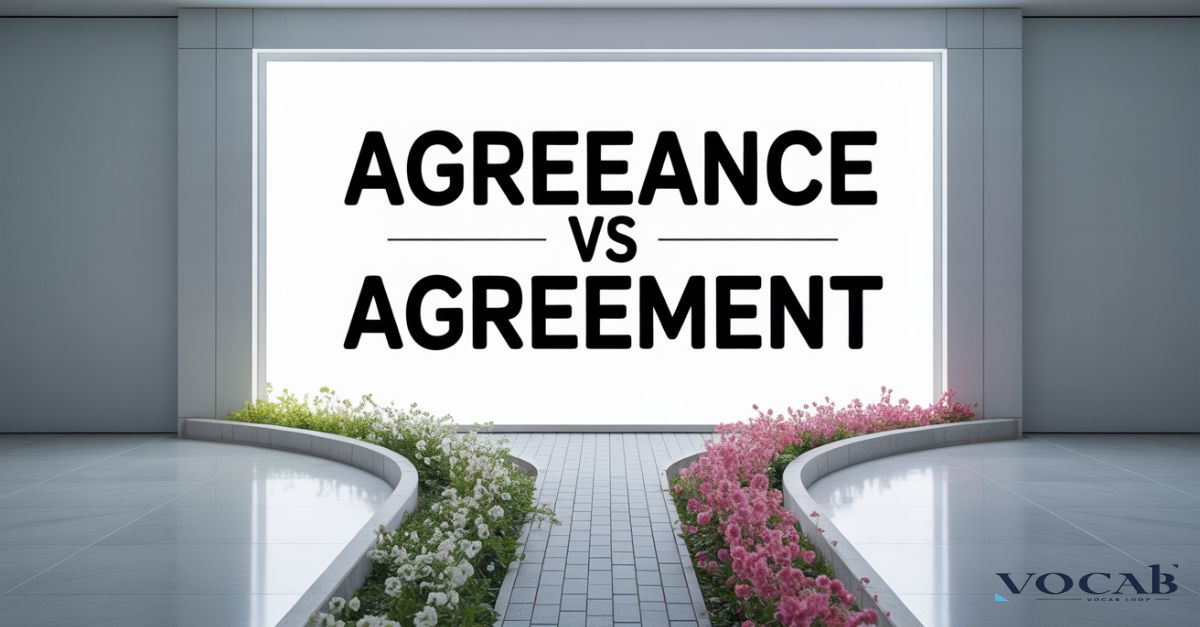When people talk about shared opinions or deals, they sometimes use the word agreeance instead of agreement. But is agreeance a real word? Or is it just a common mistake? Many writers and speakers find this confusing, especially in formal settings. This article will explain the full difference between agreeance vs agreement in easy, clear language.
We’ll look at pronunciation, usage, grammar, and even the word origin of both terms. By the end, you’ll know the correct word: agreeance or agreement to use in all situations.
Why Is There Confusion in Agreeance vs Agreement
The confusion comes from how similar these two words sound and look. Both are noun forms of agree, and both suggest mutual understanding. But only one is widely accepted in modern English usage. In everyday speech, someone might say, “We are in agreeance,” thinking it sounds formal. Yet, that’s not how most people use English today.
Another reason for confusion is that agreeance sometimes shows up in movies, memes, or old books. It gives the impression that it’s a proper choice. But in standard dictionaries and writing guides, agreement is the only acceptable term in serious writing, especially in the U.S.
What Does Mean of Agreeance
The agreeance meaning in English refers to the state of agreeing or being in harmony. It’s rarely used today and often marked as an archaic word. That means it used to be more common centuries ago but isn’t anymore. Still, people sometimes use it in casual or joking speech.
If you’re wondering, “Is agreeance a real word?” — the answer is yes, technically. But it’s not recommended for use in business writing, school essays, or formal emails. It may sound smart, but it usually causes more confusion than clarity.
What Does Mean of Agreement
The definition of agreement is the act of coming to the same opinion or making a formal deal. In grammar, it can also mean the way words in a sentence match in number and gender. This term is used all the time in legal contracts, meetings, and emails.
The agreement definition legal goes further. It includes written documents that confirm a deal between two or more parties. So if you’re writing a work contract, “agreement” is the correct word to use every time.
Quick Summary Between Agreeance or Agreement
The short answer is: always choose agreement in most situations. Agreeance is outdated, informal, and often seen as incorrect. If your goal is clarity in writing, go with the term that most people understand.
Here’s a quick tip — when you’re in doubt, check your dictionary. You’ll see agreement listed as the standard, and agreeance either missing or marked as rare.
Pronunciation of Agreeance and Agreement
In American English, agreeance is pronounced as /uh-GREE-uhns/ and agreement as /uh-GREE-muhnt/. The difference is small but important. The ending “-ance” in agreeance sounds old-fashioned, while the “-ment” in agreement is more natural.
These tiny shifts in sound can change how your writing or speech is received. Using the wrong one may make your message seem less professional.
Spelling and Visual Cues of Agreeance and Agreement
There’s a big clue in the endings. Words ending in -ment like agreement often feel more polished and common. Meanwhile, words ending in -ance like agreeance tend to look older and less familiar.
Here’s a helpful guide:
| Word | Ending | Common Use | Style Tone |
| Agreement | -ment | Very Common | Formal communication |
| Agreeance | -ance | Rare | Informal usage or humorous |
Key Difference Between Agreeance or Agreement
The key difference between agreeance and agreement is about acceptance and clarity. Agreement is standard in all types of communication. Agreeance is seen as a common mistake by many experts.
Also, agreement is used in contracts, discussions, grammar rules, and professional settings. Agreeance may show up in social media or jokes, but it lacks the trust of serious writing.
Comparison Table Between Agreeance vs Agreement
| Feature | Agreeance | Agreement |
| Formal Use | No | Yes |
| Common in U.S. English | Rare | Yes |
| Seen in Legal Writing | No | Yes |
| Style | Informal or humorous | Formal communication |
| Grammar comparison | Weak fit | Strong, correct |
Common Mistakes in Agreeance or Agreement
One common mistake is saying, “We’re in agreeance,” when you really mean “We’re in agreement.” Another is using agreeance in reports or emails, thinking it’s more formal. In truth, it often makes your writing sound less polished.
Mixing up these words can confuse your readers and make your writing style look weak. For language clarity, always go with the more accepted term.
Formal vs Informal Usage Agreeance and Agreement
Agreement is always the better fit in formal communication. Think business meetings, legal documents, and news articles. It brings clear meaning and shows you understand standard English grammar.
Agreeance, on the other hand, is used in informal usage. You might hear it in a joke or casual chat. But in any serious setting, it’s better to avoid it for better word choice.
Usage in Different English Varieties Agreeance or Agreement
In American and British English, agreement is the accepted word. It appears in schoolbooks, dictionaries, and court documents. It’s part of English vocabulary everywhere.
Agreeance is used only in rare cases, and mostly by accident or humor. That makes it more of an outdated English word than a useful one.
Simple Trick to Remember the Difference Agreeance vs Agreement

Here’s a simple trick: “Agreement is the agreement we all agree on.” This rhyme helps you choose the right word without overthinking it.
Also, remember that words ending in -ment vs -ance often reflect modern vs. old usage. Stick with “-ment” for safe, clear, modern writing.
Examples of Agreeance use in sentences
- We are in full agreeance about dinner tonight.
- I found myself in agreeance with her views, oddly enough.
- They nodded in agreeance, smiling politely.
- Our team was in agreeance, though not happy.
- The whole room fell into agreeance.
- He said, “I’m in agreeance with you,” jokingly.
- Their silence showed agreeance.
- In agreeance, they moved forward.
- She used agreeance without knowing it was outdated.
- His speech ended with a call for agreeance.
Examples of Agreement use in sentences
- We signed the agreement yesterday.
- There was an agreement between the parties.
- Everyone showed agreement on the new plan.
- Their agreement ended the argument.
- The agreement covered all key terms.
- There was a clear agreement on the rules.
- They reached an agreement quickly.
- Our agreement benefits both sides.
- A peace agreement was announced.
- The contract is a legal agreement.
Synonyms Agreeance vs Agreement
Agreeance:
- Accord
- Unity
- Harmony
- Consensus
- Conformity
- Understanding
- Union
- Collaboration
- Concord
- Solidarity
Agreement:
- Contract
- Pact
- Arrangement
- Deal
- Treaty
- Settlement
- Accord
- Consensus
- Convention
- Understanding
Origins of Agreeance
The word origin of agreeance dates back to the 1500s. It was once used in Old English literature but slowly faded. Today, it’s almost never used in serious texts.
This makes it an archaic word. You may still hear it in satire or old writings, but it’s not common anymore.
Origins of Agreement
The etymology of agreement is stronger. It comes from Middle English and Old French, tied to the verb “agree.” Over time, it became the go-to term for shared decisions.
Its usage never dropped. It stayed in legal, academic, and daily speech. That’s why it’s trusted today.
Fun Fact Agreeance vs Agreement
A fun moment happened when actor Will Ferrell used “agreeance” in a comedy sketch. It went viral and made people wonder if it was real. Even though it sounded funny, it reminded viewers that English can be tricky.
Sometimes, confusing English words make their way into jokes — and then into everyday language. But that doesn’t mean they belong in your next email.
FAQ’s
Should I use agreement or agreeance?
Use agreement—it’s the standard, professional, and widely accepted term in modern English.
Should I use a contract or agreement?
Use contract for legal documents; use agreement when referring to mutual understanding or general terms.
Is agreeance an actual word?
Yes, but it’s outdated and rarely used—agreement is the correct and accepted word today.
How do I professionally say I agree?
Say “I’m in agreement,” “I concur,” or “I support that view” in a formal tone.
What do you say if you are in agreement?
You can say, “We are in agreement,” or “We’ve reached an agreement,” depending on the context.
Conclusion
The final answer in the grammar comparison of agreeance vs agreement is agreement. Every time unless you’re trying to be funny. It’s the clear, professional, and acceptable term in American English.For strong writing style, stick with what your reader knows.
Choosing the right word is part of good language clarity, especially in business writing or academic work. Avoid the trap of using words just because they sound formal. That’s one of the best writing style tips you can follow. Choose agreement — and your message will always be understood.

Alex Hormozi is a seasoned blogger at Vocab Loop, known for his deep insights into language, vocabulary, and grammar. With years of experience in writing, Alex shares practical tips and effective strategies to help readers improve their linguistic skills and enhance their writing abilities.

